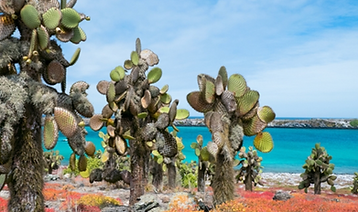Class 1: Aristotle - What is Life?
Aristotle was one of the first to ask what makes something alive. Long before microscopes or genetics, he observed how living things respond to their environment, take in nutrients, get rid of waste, and grow. In this class, students will examine how Aristotle’s early ideas helped shape the foundational question of biology: what defines life? Through hands-on sorting and simple experiments, they’ll explore key characteristics shared by all living things, and imagine how these definitions might evolve with future discoveries.

Class 3: Alexander von Humboldt – Interconnected Nature
Alexander von Humboldt believed that nature was a web of relationships: plants, animals, climate, and geography all influencing one another. In this class, students will explore how ecosystems work by mapping food chains, climate zones, and environmental connections. Just as Humboldt traveled across South America sketching plants and recording climate data, students will investigate how life forms are shaped by their surroundings. They’ll leave with a richer understanding of how life exists in relationship with everything around it.

Class 5: Gregor Mendel - Inheritance and Traits
Long before scientists understood DNA, an Austrian monk named Gregor Mendel was growing peas and asking big questions. Why were some peas round and others wrinkled? How were traits passed from one generation to the next? In this session, students will explore Mendel’s groundbreaking experiments with heredity. Using simple activities and model organisms, they’ll uncover how traits like eye color, height, or dimples are passed down, and how a garden experiment planted the seeds of modern genetics.

Class 7: Louis Pasteur - Invisible World of Germs
Before Louis Pasteur, most people had no idea that invisible organisms could cause disease. Through careful observation and groundbreaking experiments, Pasteur proved that tiny microbes—bacteria and viruses—were responsible for illness, fermentation, and spoilage. In this session, students will conduct simple (safe!) experiments that demonstrate how germs travel, learn about how vaccines work, and see how Pasteur’s discoveries laid the foundation for modern medicine and microbiology.

Class 2: Carl Linnaeus - Nametag of Nature
Carl Linnaeus believed that understanding nature started with naming it. He created the system of scientific classification we still use today, from Homo sapiens to Canis lupus. In this class, students will explore how Linnaeus grouped living things based on shared traits. Then, they’ll try their hand at creating their own taxonomy by classifying a collection of creatures (real or imaginary) with invented names, just like Linnaeus once did.

Class 4: Charles Darwin - Evolution and Adaptation
Charles Darwin forever changed biology by asking a deceptively simple question: why do animals look and act the way they do? In this session, students will retrace Darwin’s steps to the Galápagos Islands, exploring how animals adapt to their environments over generations. Through hands-on exploration of traits, survival challenges, and natural selection simulations, children will see how biology evolves. Just like Darwin, they’ll learn to look at the ordinary and ask what invisible forces might be shaping life over time.

Class 6: Rudolf Virchow – The Building Blocks of Life
Rudolf Virchow famously declared, “All cells come from cells,” sparking a new era in understanding how living things grow, heal, and function. In this session, students will zoom into the microscopic world to explore the structures that make up a living cell. From the nucleus (the “brain”) to mitochondria (the “powerhouse”) to the cell membrane (the “gatekeeper”), they’ll discover how each part plays a unique role in keeping organisms alive.

Class 8: Jennifer Doudna - Biology's Future
Jennifer Doudna helped develop CRISPR, a groundbreaking gene-editing tool that allows scientists to cut and change DNA. In this session, students will learn what genes are, how CRISPR works, and imagine how gene editing could solve real-world problems such as curing diseases, but also introduces ethical dilemmas. Through creative role-play and discussion, this future-looking course asks students to consider both the potential and the responsibility of shaping life itself. Advances in biology, such as mRNA technology, will also be explained and debated.

